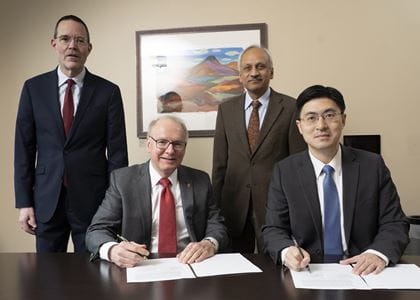INDIANAPOLIS—Purdue University College of Engineering and Indiana University School of Medicine are launching a new educational and research partnership to develop novel technological solutions for pressing health care problems.
While the two institutions have collaborated for decades, the new Engineering-Medicine partnership formalizes the relationship and represents a long-term commitment to meld the institutions’ complementary expertise.
“The marriage of medicine and engineering is essential to developing the most advanced diagnostics and devices to treat patients,” said Jay L. Hess, MD, PhD, MHSA, dean of IU School of Medicine and executive vice president for university clinical affairs. “This partnership leverages existing expertise, optimizes public resources and positions Indiana to be a leader in the development of technologies that transform health.”
“Medicine is key to the future of engineering, with biomedical engineering front and center but important roles as well for nearly all engineering disciplines,” said Mung Chiang, the John A. Edwardson Dean of the College of Engineering at Purdue. “We are grateful for our long, productive relationship with IU School of Medicine, including our ongoing MD/PhD program. Our collaboration is now strengthened with the simultaneous launch of multiple new programs that will help elevate engineering-medicine synergy through cross-disciplinary education, research and innovation.”
The partnership:
- Establishes an MD/MS in biomedical engineering program that will provide master’s-level training to IU medical students who seek to develop and apply engineering technologies in their clinical practices and related research laboratories.
- Creates the Clinical Innovation and Translation (ICT) Fellowships in Biomedical Engineering, a new program that will immerse Purdue engineering graduate students in clinical settings and provide mentorship from faculty at both institutions so they are better prepared to translate technology directly into hospital and ambulatory health care settings.
- Provides opportunities for IU School of Medicine students interested in exploring research in biomedical engineering to embed in Purdue College of Engineering faculty research groups during the summer.
- Formalizes annual research collaboration meetings between faculty at each campus to spur joint projects and share expertise.
- Bolsters a program administered by the Indiana Clinical and Translational Sciences Institute that provides pilot funding to cross-disciplinary research projects involving faculty from both institutions.
The new programs build on and strengthen existing educational and research collaborations, including a highly selective MD/PhD program in biomedical engineering. IU and Purdue are partners in the Indiana Clinical Translational and Sciences Institute, and IU School of Medicine and Purdue College of Engineering faculty members are collaborating on about 50 research projects in various stages of research and development, clinical trials and clinical practice.
Recent examples include a new Type 1 diabetes therapy that shows promise for long-term reversal in both humans and dogs and a new imaging technique that provides a detailed 3D image of the brain with important implications for studying Alzheimer’s disease.
“Whether we are developing new tests to diagnose cancer at earlier stages, improving surgical devices, or seeking ways to regrow damaged organs, we need the best minds from many disciplines working together for the benefit of patients,” said Anantha Shekhar, MD, PhD, executive associate dean for research affairs at IU School of Medicine and director of the Indiana Clinical and Translational Sciences Institute. “We are fortunate to have such strong programs in medicine and engineering in Indiana, and we feel confident that our joint efforts will strengthen the state’s critical life sciences sector.”
Chiang added, “Through the expanded partnership, our goal is to broaden Purdue Engineering’s impact on health to match our contributions in many other technological realms, such as space exploration. The now enhanced collaboration with IU School of Medicine represents yet another Purdue giant leap forward.”




